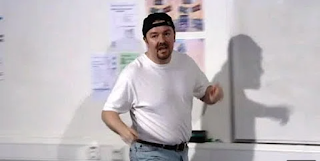The other day I attended a fascinating webinar on the neuropsychology of resilience, put on by the Association for Coaching. Having read quite a lot about neuropsychology and coaching for my ILM 7, I found there was
not a lot that was new to me; but there was a lot I had known and forgotten, so it was a very valuable refresher. And later, by coincidence (if one believes in coincidence) I saw this flowchart posted by @nathanfiler on Twitter, along with the description: I've been interviewing some of the world's leading experts on the neuroscience and psychology of emotion. I've distilled their main findings into this handy flowchart. You're welcome. That made me laugh.And I laughed because of recognition: for myself, this rings true. And also because of the puncturing of the overblown nature of some of the stuff out there that labels itself neuro- this that and the other. (Another twitter feed I enjoy is @Neuro_Skeptic).
And before everyone tells me, of course the flowchart is inadequate - that's part of the joke. But that raises another question: should we joke about such matters? My temptation is to say an unequivocal yes; I am a strong believer in the value of humour, not least with regard to resilience. At the cognitive level, humour offers us a change of perspective (that is almost a definition of how it works) that is often very healthy; at a social level, it can strengthen connections between people; and at a neuropsychological level, it is said to cause a release of endorphins (as explained by David Brent, memorably...). All of these are valuable in the context of resilience.
But of course, a more nuanced answer is: it depends. If one has reason to believe that the joke will not strengthen connections, but rather irritate, alienate and so on, then it is better left untold.
But given that the flowchart is inadequate, what else did I learn, or re-learn, on my recent webinar? One of the things that came home to me most forcibly, and has had me reflecting since, is the instantaneous (or as near as makes no difference) reaction of the amygdala to any stimulus. The evaluation: Threat? Yes/no? and in the event of Yes, the stimulation of the fight/flight/freeze response.
Yet I have long been a great believer in Frankl's work, and his observation (hard-won in the concentration camps) that 'Everything can be taken from a man but one thing: the last of the human freedoms—to choose one’s attitude in any given set of circumstances, to choose one’s own way.' How does one (how do I) reconcile that with this over-riding of the conscious will by the amygdala, that pumps the system full of aderenaline, and partially shuts down the pre-frontal cortex in order to divert energy for the predicted fight or flight?My current tentative answer lies in a few other things that we know about resilience and stress. Stress is sometimes defined as our reaction when the perceived challenge is greater than our perceived ability to cope. The issue of perception is key here: and that is something we can work on. By managing that, we can reduce the likelihood of the amygdala hijack, as Goleman calls it.
Secondly, and related, there is growing evidence for the value of meditation in reducing stress responses. One of the reasons for that may be the calming of the amygdala; we know that when one is in a state of high arousal, a stress response is more likely, so it seems plausible that the reverse may also apply. Also, if one's meditation is not content-free, but rather on some transcendent truth or being (for myself, I am a Christian), then that will also work on the issue of perception.
We also know about the value of exercise in this context; both the physiological benefits, and the psychological ones (that when we exercise we feel better about ourselves and have a greater sense of agency).
And finally, we know the importance of human connection: and again that probably works on many levels. At the level of perception, we may be more likely to fall victim to catastrophising when we are on our own, particularly if we feel isolated; and also, spending time with those we love has positive effects on the mix of neurotransmitters sloshing around in our brain (oxytocin and all that...).
So my work-in-progress solution to the question I raised earlier in this post is that whilst one is not, in the instant, in control of the amygdala's response, there is a lot that one can do over time to reduce the frequency and the impact of it, by attending with some discipline to one's wellbeing with regard to all of the physical, mental, social/emotional, and spiritual/existential aspects.
And, of course, though one may be subject to an amygdala hijack, one need not be victim to it. Noticing what is going on for oneself, and then, as my late, wise mother counselled*, counting to ten, is a very valuable discipline, too.
* I am told she was not the only person to have divined this wisdom.
--



















